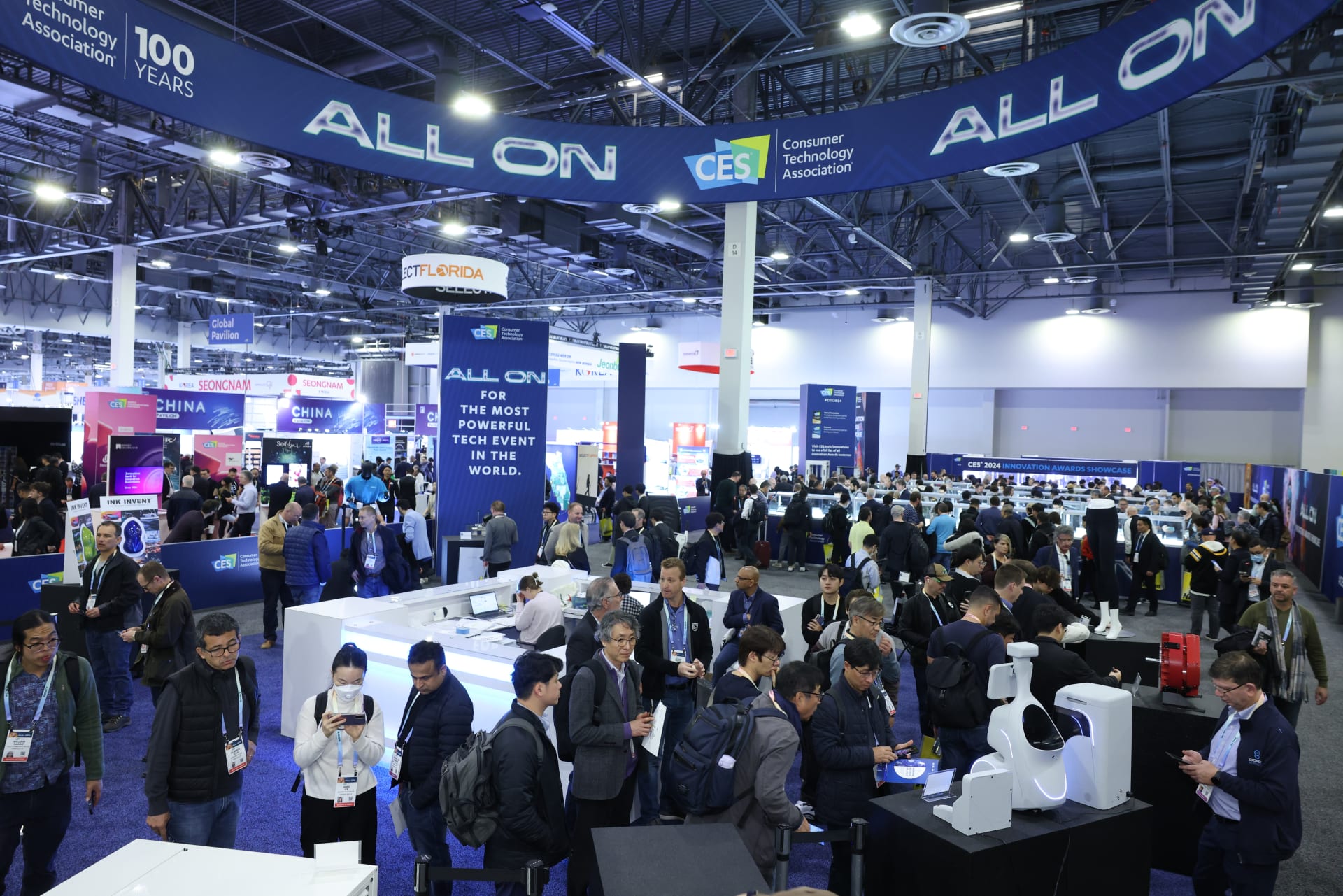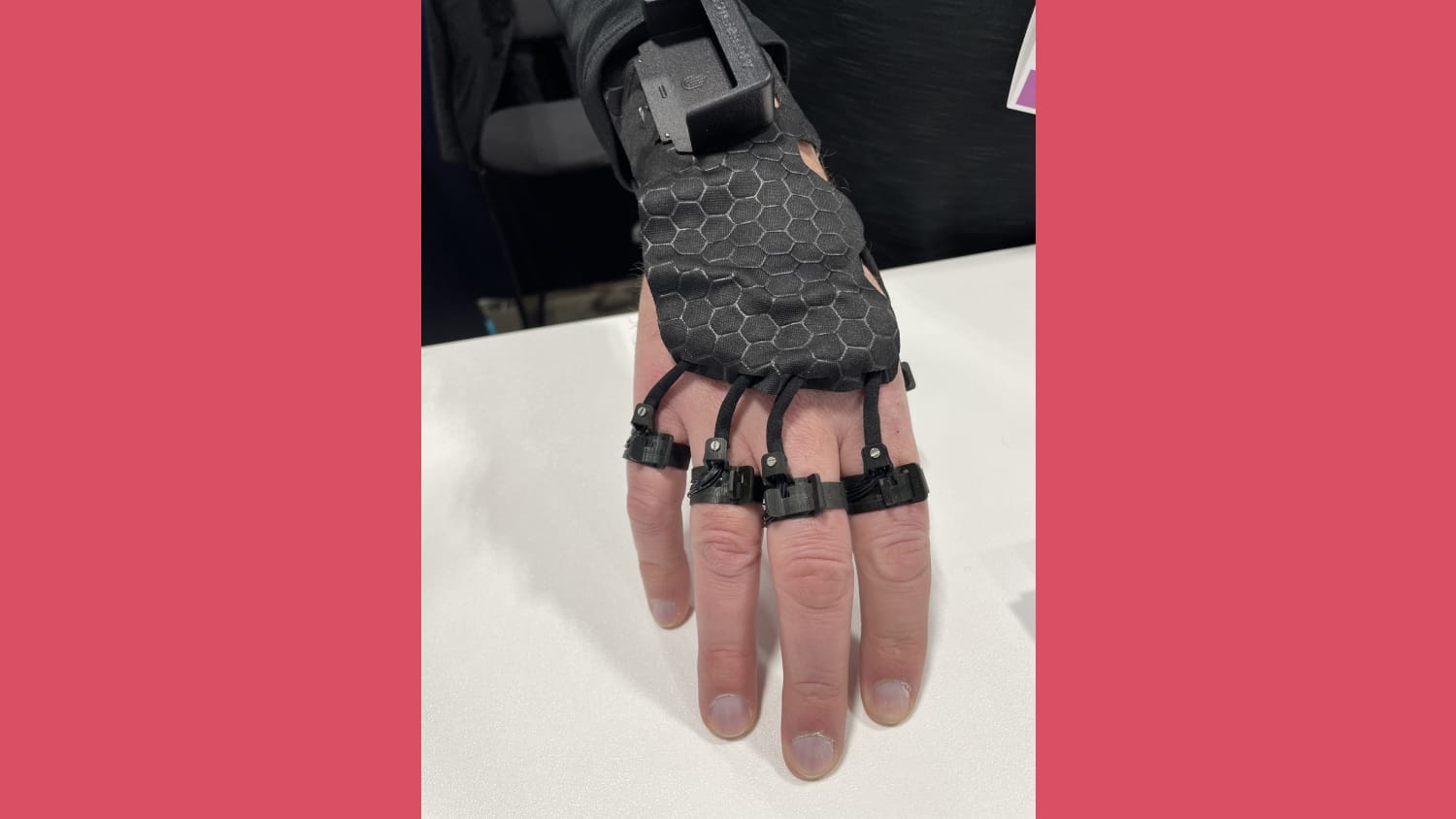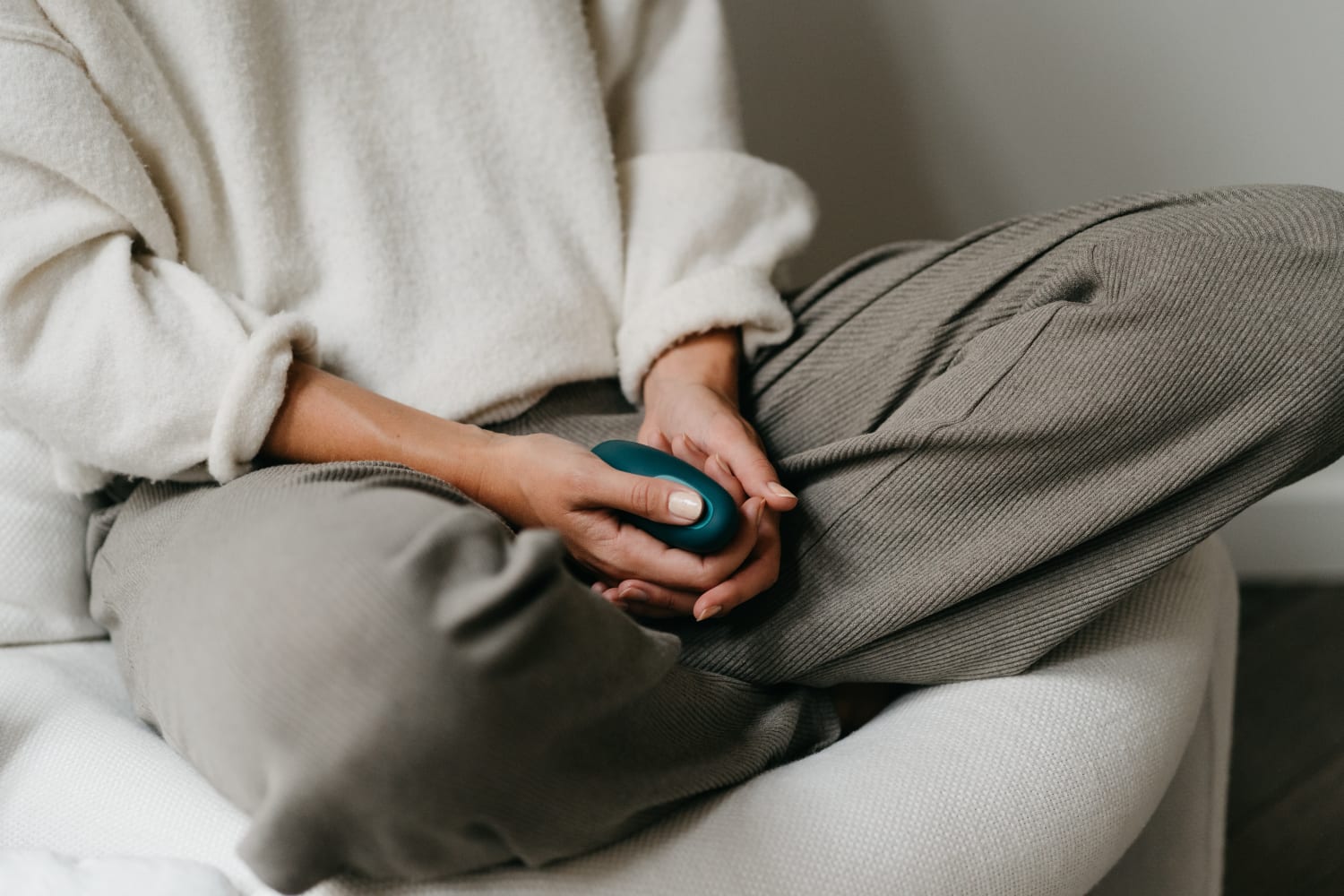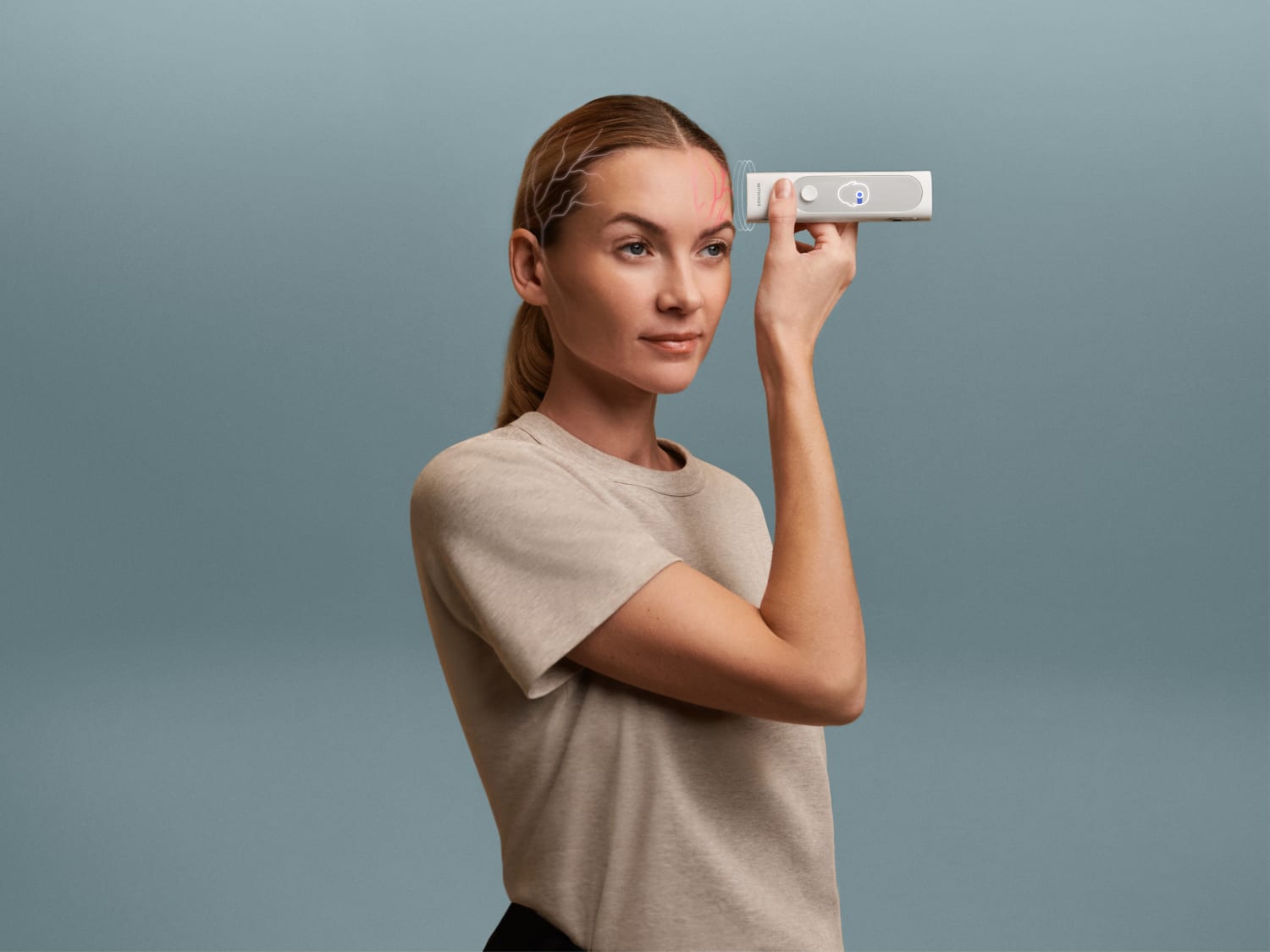The Consumer Electronics Show kicked off 2024 with a dose of optimism rooted in the transformational potential of technology. A chilly Las Vegas once again played host to the event, welcoming more than 135,000 attendees and over 4,300 exhibitors across the week. VML Intelligence was on the ground pacing the exhibition halls, picking out speaker highlights and capturing the innovations to watch. AI was indubitably the headline act this year, but 2024 also ushers in a new era of spatial computing, while technology continues to carve out its role as a force for good. Read on to discover these, and all the other trends that made our 2024 roundup.
At the world's greatest consumer tech show in Las Vegas, the age of ubiquitous AI is upon us
Ubiquitous AI
AI was everywhere at CES, and at a fireside chat featuring Stanford professors Andrew Ng and Fei-Fei Li, two great thinkers in the space, it became clear why. Ng described AI as a “general purpose technology, meaning that it is not just useful for one thing, kind of like electricity.” Li alluded to its universal impact, adding that AI “is here to stay, deepening into all vertical businesses and customer and consumer experiences and changing the very fabric of our societal, political, economical landscape.”

In terms of AI breakthroughs to look out for in 2024, Ng also pointed to the rise of ‘autonomous’ or ‘assistive’ agents that can plan and execute a sequence of actions. In his view these are “just barely working” right now, but he sees a lot of traction on the research and commercialization side.
One commercial AI launch that garnered attention at CES was the Rabbit R1, an AI powered pocket gadget. From US startup Rabbit, the palm-size device is an assistant that learns how to use smartphone apps, allowing the user to issue simple, natural language instructions to to get things done, such as ordering a cab, or booking a restaurant, all without needing to open their phone. The popularity of the device was evident when pre-orders totalling 30,000 units sold out in just three days—expect to see more AI gadgets like this in the pipeline.
Spatial Tech
A new era of spatial tech is getting underway, with the arrival of a new batch of mixed reality headsets and glasses. The term describes a raft of technologies that allow devices to navigate and understand 3D space. At the Shopping in a 3D world panel, Niantic’s director of product AR platforms, Tom Emrich, predicted that the contextual advantages of smart glasses and headsets would turn smartphones into a “sidekick” and a “hub for all things wearable devices.”
Despite not having a presence at CES, Apple managed to steal headlines by announcing that its much-anticipated Pro Vision headset would go on sale in the United States February 2. Now more devices are in the pipeline, with Samsung and Google rumored to be working on headsets. At CES though, XReal’s Air 2 Ultra glasses with spatial computing features attracted attention. Priced at a more affordable $700, and targeting developers, this could help spur wider adoption. Sony too teased its “immersive spatial content creation system” that it is developing in partnership with Siemens, although this will target professionals rather than consumers.
- Sony. Immersive spatial content production system 3DCG production usage image
- XReal Air 2 Ultra AR glasses
The rise of spatial computing will drive innovation in other hardware devices too. Aside from headsets, folding phones (like Samsung’s Flex In and Out Flip concept) that open out to provide a bigger screen for spatial experiences made a big comeback this year.
According to Emrich, the spatial tech category “is just coming together. But this means that it presents a massive opportunity for app developers, for web developers, for brands and retailers especially to get their feet wet,” he said, adding, “I agree with Tim Cook, the spatial computing era has arrived and we’re just getting started.”
Tactile Realities
Appetite for multisensory experiences was prominent at CES, as tech developers go beyond sight and sound to add a layer of touch to the digital world.
Afference, a company founded by neural engineers, is enabling touch for the spatial computing era. During the show, Afference showcased Phantom, a neuro haptic device consisting of adjustable rings, lightweight harness and a neural stimulator that communicates directly to the sensory nerves in the finger. Unlike most haptic gloves, the palm and fingers are uncovered, allowing for “seamless tactile experiences across digital and physical worlds.”
Co-founder and CSO Dustin Tyler, a world expert in neural interfaces, explained to VML Intelligence that by unlocking the sense of touch, the device brings greater reality to experiences: “The value of touch is huge. It’s connection. Connection to virtual worlds, connection to people.”
- Microtube HEXR haptic glove in virtual reality
- Phantom, Afference neuro haptic device
Singaporean start-up Microtube presented HEXR, the first untethered pneumatic haptic glove which enables sensation in spatial and metaverse environments. Initially developed for training contexts – demonstrating to medical professionals how the body feels for example, or helping pilots build the muscle memory of landing a plane – upcoming developments according to co-founder and CEO Yeo Joo Chuan include a glove that allows wearers to feel a handshake or enjoy a fitness experience.
The Connected Hearth
This year a slew of innovations aimed to soothe any anxieties associated with caring for much-loved members of the household. Three categories came out strong: parenting, senior care and pets.
Aimed at parents, Glüxkind Technologies’ ‘Rosa’ is an AI-powered self-driving stroller with the mobility of an electric bike coupled with features like integrated speakers that play white noise and a ‘rock baby to sleep’ feature. In a similar vein, Korea’s Emma Healthcare showed its BebeLucy smart bassinette, offering peace of mind thanks to its ‘multi-modal AI care system’ with real-time monitoring of health signals. Boston-based startup Cappella also showed its eponymous app, based on an AI model trained to detect and analyze baby cries. CEO and MIT alum Apolline Deroche told VML Intelligence that “we want to push the frontiers of baby cries” by applying their technology in a medical setting next.
For elders, technology can be the key to independent living. Belgian age tech company Nobi launched a ceiling-mounted version of its award-winning Smart Lamp that can detect falls and notifies carers for help if needed. CES 2024 also saw the return of Intuition Robotics’ care companion ElliQ, which provides support, enrichment and facilitate social connections for older people. Chief product officer Ronen Soffer told VML Intelligence that ElliQ 3.0 now comes with upgraded hardware and AI enhancements, offering free flowing conversation, much of which can now be processed locally for greater privacy. According to Soffer the goal of ElliQ is “to understand, enrich and strengthen relationships – and relationships make your life better. Whatever we can connect you to in the real world, we want to do more of.” As the global population ages, technology catering to this growing cohort holds much promise.
- Nobi Ceiling pendant light
- ElliQ 3.0 companion device from Intuition Robotics
When it comes to four-legged friends, tech companies are aiming to alleviate emotional stress for owners. Invoxia’s Minitailz AI wellness tracker for dogs issues health recommendations that help to “reduce the emotional load on the owner” according to PR Anna Azarova. iLume is also “taking out the emotional aspects of feeding” according to its CEO Craig Silbery. The Australian startup offers a connected bowl and tracking collar that helps owners prevent obesity by tailoring meals to their pet’s precise needs based on physical activity. Talking to the animals could soon become the norm thanks to French startup Neovoice which claims its app can detect pets’ moods or emotions from an image alone.

Home Clinic Hubs
The medicalization of home wellness continues to evolve, with new devices offering comprehensive health insights as well as a deeper understanding of our bodies.
French consumer tech player Withings was a breakout star of the show with its “thermometer of the future.” The BeamO portable device, dubbed a “multiscope,” allows users to track vitals from home with four different medical checks that can be completed in under a minute: a contactless thermometer to measure body temperature; an electrocardiogram for tracking the heart rate; an oximeter to measure blood oxygen; and a digital stethoscope for the heart and lungs. VML Intelligence spoke to Paul Buckley, director of sales and marketing for Withings North America, who said the device would help patients give better information to their doctor, “giving them a better indication of what’s going on in your body, so they can better diagnose and better prescribe medicine.”
- Withings BeamO multiscope device
- Baracoda BMind AI wellness mirror
- Moonbird. Copyright Christine Smeyers, Soulstudio.be
The first smart mirror for mental wellness was on display this year. The BMind, an AI-powered mirror by Baracoda (also based in France) helps evaluate and feedback on mood, and offers experiences that manage stress via light therapy and personalized mindfulness practices.
Growing awareness of the positive role of breathing well in our health is prompting tech that can help us do it better. Moonbird is the “world’s first handheld breathing coach,” a sleek pebble-sized device that promises to tackle stress and promote better sleep through guided exercises.
Such innovations will enable people to take even more control over their own health while also relieving some of the pressure on healthcare systems.
Tech For Good
A key focus for CES in 2024 was the connection between technology and human security. Across the show, speakers and exhibitors zeroed in on the many ways tech can uplift humanity and solve critical challenges.
Hyundai Motor unveiled its vision for a hydrogen-powered future, showcasing plans including innovative plastic-to-hydrogen (P2H) and waste-to-hydrogen (W2H) processes. They are also developing the manufacturing capability for green hydrogen, hoping to bring this to market within the next few years. “Clean hydrogen should be for everyone, powering everything, and available everywhere,” said president and CEO Jay Chang in a statement.
- Hyundai Motor pavilion at CES 2024
- MidBar inflatable farm at CES. Courtesy of the Consumer Technology Association
Elsewhere at the show, innovations underlined the power of technology to improve lives and address urgent problems. Highlights included the Japanese startup inQs’ SQPV glass that can harvest energy and generate power from sunlight and dim indoor light; the world’s first inflatable aeroponic farm by MidBar from Korea that enables food production anywhere, cutting water needs by 99% compared to conventional farms by converting moisture from the air in real-time; and even a surveillance technology from Bosch Security Systems that uses AI to enable proactive security and tackle the issue of guns in schools.
Undoubtedly the world faces much uncertainty over the coming months, but the innovations at CES brought some optimism, underlining the pivotal role that technological advances will play in helping to secure our future.
Main image: Exhibition halls at CES. Courtesy of the Consumer Technology Association.
Please provide your contact information to continue.
Related Content
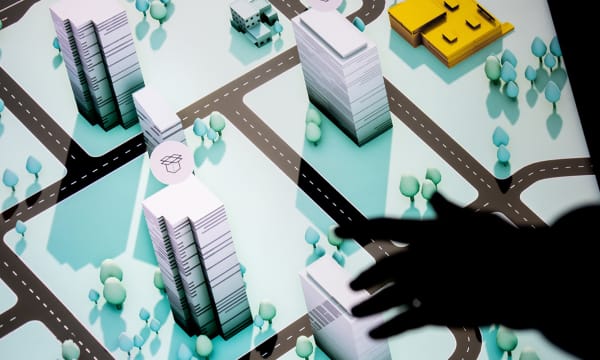
CES 2023: Key trends

